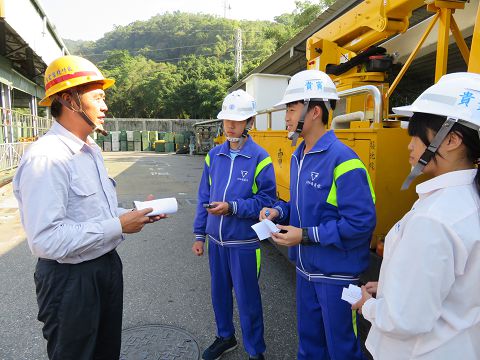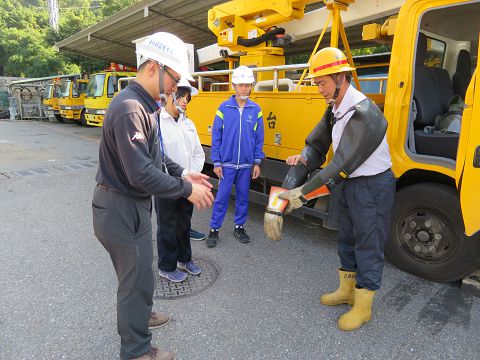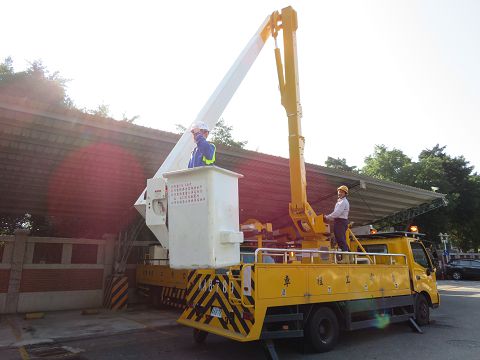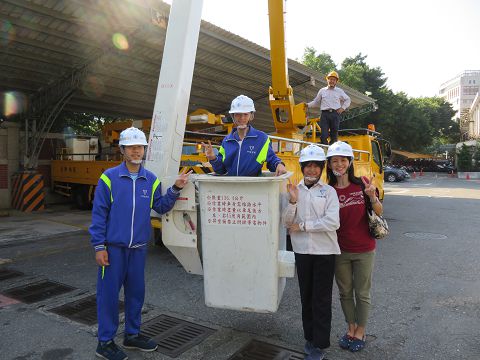|
 People
People

¡i
Dajia River Hydroelectric Power
Plant Manager ¡j ¡i Docent of
Taipower Exhibit Center in Northern Taiwan ¡j
¡i The Director of Nuclear Power Plant 1 ¡j ¡i
Wind Power Patrolman ¡j
¡i Thermal Power Boiler Director
¡j¡i Substation Maintenance ¡j
¡i Power Saving Promotion Staff in
North District ¡j ¡i Director of
Power Distribution ¡j ¡i Taipower
Spokesman ¡j
We
investigated the workers of different units about working
experience and content so that we could understand Taiwan
Power Company more.
 Substation Maintenance
Substation Maintenance
Interview¡GShih-Huang Li
Date¡GDecember 22nd, 2018
Place¡GTaipei North
Service Office in Taiwan Power Company
|
 |
 |
|
Interviewing Mr. Li |
Mr. Li explained the equipment during maintenance |
Q1: Could you tell us your title,
work experience and content?
A1: I have been in Taipower for 27 years. I am the
foreman in outside work. My job is maintenance such as
replacing the old poles and old transformers near home.
Q2: How did you get into Taiwan Power Company?
A2: I was from Kinmen. When I graduated from high
school, it was not easy to get a job. Therefore I went to
Taiwan. I had been admitted to Oceanology College and I had
also been admitted to R.O.C Naval Academy, but it was big
spending on studying to family at that time. I can make
money after I have been admitted to the power company for
half a year, so I chose to work for Taipower. I entered
Taipower at the age of 18 and have been serving until now.
Q3: What qualifications or expertise do you have?
A3: Early employees had to graduate from high school.
We are trained for six months after entering the company and
learn a lot of skills. We have to climb the pole every day.
There are excellent coaches to teach new staffs, and help
them to pass the C-level personnel of the external technical
license because Labor Standard Laws requires at least with
C-level license to work in an elevated position of more than
two meters. After distributing to other units of Taipower,
they must take the B-level and even the A-level license by
themselves.
Q4: What level did you get?
A4: I am A-level.
Q5: How long do they get an A-level license?
A5: The previous regulations are stricter. At that
time, they had to wait for 2 years after getting C-level, so
they could take B-level exam. And they still needed to work
for 4 more years, and then they were just allowed to take
A-level exam unless they have bachelor degrees. Otherwise,
they would take much time.
Q6: What situation do you usually repair in work?
A6: There are types of units and they are different.
One is working whole days without break. My job belongs to
the other one which works from eight a.m. to five p.m., and
I will arrange the schedule to repair. For example, when
equipment is out of order or too old, we will arrange the
power failure and we have to fix or renew the equipment
during the time. I used to stay in another unit for ten
years. It is a 24-hour service. Just one call (1911), no
matter how late they will help you.
|
 |
 |
|
The hoist-away can lift people |
Experience the engineering maintenance vehicle |
Q7: How many people to go to
repair at once?
A7: It depends on the manager. Sometimes, he appoints
five to six people. If it is a construction at night, he has
to consider one more person who directs the traffic, so he
will ask more people to deal with it. Thus, the number of
people involved in the repair is not necessarily the same.
Q8: How long do you spend on repairing?
A8: Each time is different. We would try to finish
our work before six o¡¦clock in the morning, and we start
from one o¡¦clock in the morning. If we work from nine a.m.
to twelve p.m. or from one-thirty to four p.m., we would try
to finish in three hours.
Q9: Is there any risk around your working place?
A9: My job is really high-risk because I often climb
up the utility pole which is eleven thousand voltages. I
also have to climb up high more than two meters. To protect
myself, we will fasten the belt and rope. Even I might
inhale the toxic gas when fixing the subway cables under
manhole cover.
Q10: How do you reduce risks?
A10: We have plenty of safety garments, and pay more
attention when climbing the utility pole. When we have the
power failure, we would connect the ground wire.
Q11: What is the challenge when working? How do you
dealt with it?
A11: The most challenging thing is to train the
recruit, and our role is like a teacher. It is easy to teach
smart student because they can learn fast; however, it is
much challenging to teach students with common grades. We
usually have much sense of achievement when latter ones get
good grade. By the way, we also have female maintainer twice
a year, even they have Second license which many of the male
colleagues cannot pass the exam. The range of the age is
also wide, which from twenties to forties, etc. My challenge
is to teach them with various ways, which is the best way
for only themselves, though I have to teach thirteen to
fourteen students at the same time, especially the company
asks all the staff must have the Second license.
Q12: Is there any gap year among the maintenance
staffs?
A12: It is a very serious huge gap. Like our unit,
Except for two of us, all other work experience is worse
than us for more than 20 years. Thus, we have to train the
new recruits well as soon as possible.
Q13: What is your sense of accomplishment during
work? Why?
A13: It should be that we tried our best to repair
the electricity in very short time after the typhoon.
Although many unexpected problems would happen, we did not
only overcome them but also fix them well. In the beginning,
the users would blame us why we hadn¡¦t solved problems yet.
The thing we could do is only saying sorry to them. However,
their acknowledgment is the biggest comfort for us!
 |